Posted by Filiberto Boncompagni on 05-19-2007 04:26 AM:
Fakes again
Oh, thank you, Pat (any more photos of Daghestan Kilims
pleeeeese?)
The theme of “reproduction” rugs surfaces again. Or “fake
rugs”: I do not recall ever seeing a rugs sold as “reproduction rug made from
old wool and processed to appear antique”, do you?  Meaning that pieces like
these:
Meaning that pieces like
these:
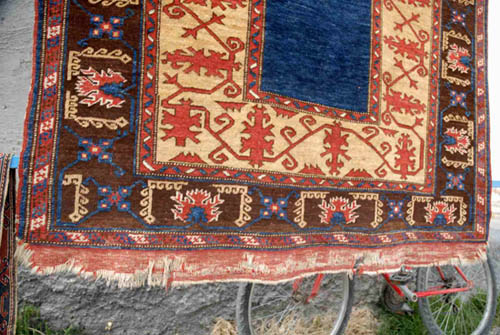
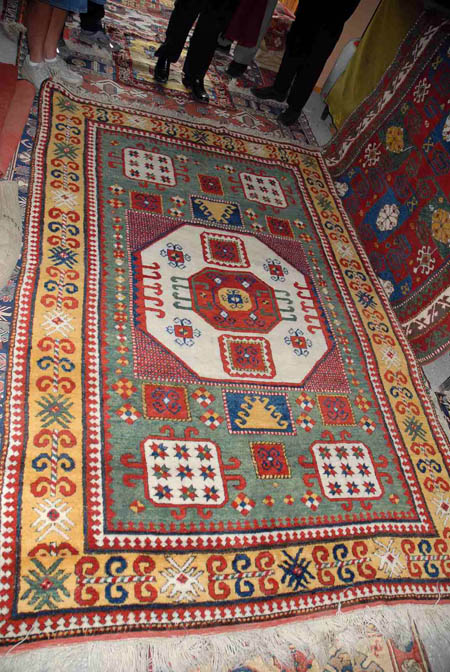
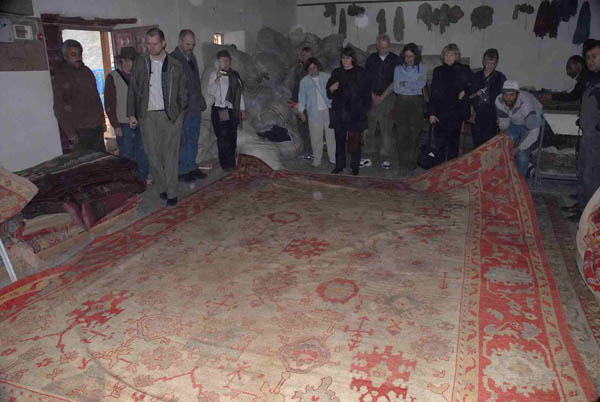
will undoubtedly end on the
market as antique.
And they seem very well made, like your close-up
shows:
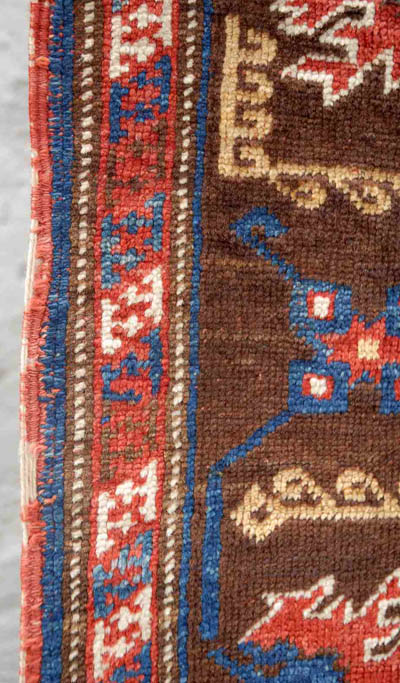
From
the photo, it looks like a genuine rug to me. Do you agree?
Well, now that
I know it, there is too much irregularity on the brown field for a normal
abrash and the knots seem also a bit too irregular, perhaps… Anyway, people who
made it have all my respect.
What do you think, folks… it could be
possible to check the rugs for the presence of rubber from tires, to tell them
apart from the real ones? 
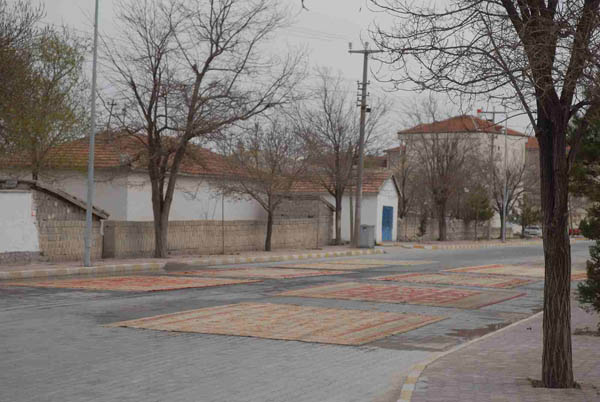
Regards,
Filiberto
Posted by Richard Larkin on 05-19-2007 12:56 PM:
Filiberto.
This post seems as though there was another preceding it
that I haven't seen, such as one from Patrick showing fake rugs. Anyway, it is
sobering to see these convincing examples. It was this kind of risk in the
marketplace that made me first suggest that James's excellent Ersari/Beshir on
the other thread might be new. It looked too good. (I've since retracted that
charge.)
When I saw the first DOBAG rugs about 20 odd years ago, I
realized how feasible it was for skilled persons to approximate old quality
rugs. Before that, one did not see this sort of thing. I saw many rugs in the
middle of the streets in Teheran and Isphahan, but they were obviously fair to
poor quality with unpleasant colors that would not have fooled anybody who knew
what a good rug should look like.
Did Patrick post something somewhere
that I've missed, illuminating this question of "fake rugs?"
__________________
Rich
Larkin
Posted by Filiberto Boncompagni on 05-19-2007 01:35 PM:
Hi Richard,
No, you didn’t miss anything, but - besides the fact that
we were discussing about fakes a month of two ago (in a thread that we HAD to
close), the subject is a recurrent one.
And I was thinking more
specifically about the piece that appeared at ACOR 2002 (or was it 2001?) and
was discussed in this thread of Salon 85: Repairs and Fakes… A Smooth
Transition.
Regards,
Filiberto
Posted by Unregistered on 05-19-2007 01:50 PM:
Filiberto,
Thanks for that link. I hadn't seen it.
Posted by Steve Price on 05-19-2007 02:38 PM:
Hi
Kindly overwrite the word "unregistered" in the user name field in
future posts. We don't permit anonymous or pseudonymous
posting.
Thanks.
Steve Price
Posted by Richard Larkin on 05-19-2007 05:40 PM:
Steve,
That was me, too. Same oversight. Sorry for the inconvenience.
__________________
Rich
Larkin
Posted by Sue Zimmerman on 05-20-2007 12:00 PM:
Seeing these rugs on the street makes me wonder what effect leaked engine oil
on wool would have on carbon dating? That would make an interesting test.
Sue
Posted by Filiberto Boncompagni on 05-20-2007 12:12 PM:
Hi Sue,
I was wondering, instead, what would happen if a car brakes on
a rug-covered road… A crash without the shrieeeeeek??!! 
Filiberto
Posted by Sue Zimmerman on 05-20-2007 01:21 PM:
There you go, Filiberto. How about rolled rugs as car bumpers? Quiet, lower
repair bill crashes -just scroll out a new section until proper ageing has
occurred and then return them to "ye olde rug shoppe" when you get to the end of
the rolls for replacements. Someone's probably already doing it somewhere.
Sue
Posted by Patrick Weiler on 05-21-2007 01:01 AM:
Sue,
They did use rugs for transportation (magic carpets) quite some
time ago, but the auto industry put them out of business because it would cost
them profits. Just like the oil and auto industries are suppressing the
technology to produce 200 mile per gallon cars. 
And we shouldn't call these rugs
fakes. They are "reproductions".
Seriously, the companies manufacturing
these reproductions can obviously sell them as such for more than they would get
if they just made them as new, unaltered copies of historic rugs. Otherwise they
would just make copies of the originals without the added cost of altering them.
(although putting some water on a rug and leaving it on the street for a week or
so probably doesn't cost very much)
These manufacturers are not selling
these pieces on the secondary market, where unsuspecting purchasers are getting
less than they are hoping for. It is not like the Romanian Tuduc who sold his
pieces through intermediaries as original antiques.
There are reputable
manufacturers making rugs that look like aged Serapi's, Oushak's and such and
they are selling them to the designer trade and upscale merchants as exactly
that, reproductions made to look old. And there is quite a demand. (although it
does not come from cheapskate junk-food buyers like myself)
On the other
hand, I did see quite a number of pristine beetle-bags and other "valuable"
collector tribal pieces that looked too good to be true at the ICOC. This is
good news for collectors like me who have a pile of worthless junk - no one will
bother faking it for a profit!
Patrick Weiler
Posted by James Blanchard on 05-21-2007 07:39 AM:
Hi Patrick,
I see a fine line between "reproductions" such as these,
and "fakes". The only difference is the approach taken by the seller. If they
are sold as antiques, they are fakes. If they are sold as new made to look old,
they are reproductions. You mention that there are a number of manufacturers who
are up front about the age and nature of manufacture. However, I suspect that a
relatively large proportion of this type of production ends up being sold as
"fake" antiques.
Buyer beware. Now I'll have to remember to keep an eye
out for tire tracks, engine oil and the smell of tire rubber as one more means
of assessing potential rug purchases!
James.
Posted by Patrick Weiler on 05-21-2007 10:31 AM:
fake reasoning?
James,
There are also people who are selling modern Baluch pieces as
antique, mass-production post-WWII pieces as antique and replica tribal pieces
as antique. Some are just ignorant, others are scamming the ignorant.
The
market for, and availability of, extremely good old pieces is rather miniscule.
Prices for 150+ year old pieces in great condition are considerably above the
means of average collectors. With only a few dozen major auctions per year
worldwide and at most a few hundred dealers of actual, authentic, antique rugs
anyone wishing to start a collection of really great pieces needs to be a
millionaire. And even millionaires are buying reproductions - who wants to buy a
rug for $100,000 and let their friends walk on it, when a $10,000 version will
do?
Patrick Weiler
Posted by Sue Zimmerman on 05-21-2007 10:39 AM:
Hi Pat,
I don't know what purchasers of these rugs might be getting. One
thing that concerns me is that along the watered rug road the telephone pole
looks as alive as the trees. Did you see any living trees in Turkey? It looks
pretty darn grim in the photos. Sue
Posted by Steve Price on 05-21-2007 10:52 AM:
quote:
Originally posted by Sue Zimmerman
Hi Pat,
I don't know what
purchasers of these rugs might be getting. One thing that concerns me is that
along the watered rug road the telephone pole looks as alive as the trees. Did
you see any living trees in Turkey? It looks pretty darn grim in the photos.
Sue
Hi Sue
If you visit central Virginia during
December, January or February, you'll see trees just as "dead" as the ones in
that photo. Arrive in May or June, and most will have been miraculously
resurrected. Our telephone poles, on the other hand, remain dead all year
round.
Steve Price
Posted by Sue Zimmerman on 05-21-2007 11:24 AM:
Hi Steve, No roadside tree leaves yet in April in Turkey? That surprises me.
Out here in the midwest our phone poles remain dead, too, although some
woodpeckers would disagree. Sue
Posted by James Blanchard on 05-21-2007 11:27 AM:
Hi Patrick,
Well, um, I think $10,000 is actually a lot of money for
any rug that is not a masterpiece or of high ethnographic or historical
interest. Maybe I don't know the market that well. Still, I wonder what is the
mindset behind those driving this "honest reproduction" market? I can better
understand something like the DOBAG project rugs where you get a rug in terrific
shape with good designs and good wool. But what is the extra appeal of a rug
that has been been "aged" in this fashion? I can imagine the parlour
conversation between an owner of this carpet and an interested
visitor...
Visitor: "Wow, that looks like a really old carpet! Where did
you find it?"
Owner: "Well, actually, it was made just last year with oldish
wool using an old design, and then beaten up and driven over by trucks and cars
to wear it out so that it looks really old."
Visitor: "Oh... wasn't the opera
breathtaking this evening?"
It strikes me that getting a really old
design, but not with really old wool and really old dyes, is much diminished
from a really old carpet. Beating it up seems to make things worse, not better,
if the seller and buyer know that it is all artificial.
But, "chacun à
son goût"...
James
Posted by Steve Price on 05-21-2007 11:40 AM:
quote:
Originally posted by Sue Zimmerman
Hi Steve, No roadside tree
leaves yet in April in Turkey? That surprises me. Out here in the midwest our
phone poles remain dead, too, although some woodpeckers would disagree. Sue
Hi Sue
Central Virginia has leaves by mid-April, but
you don't have to go very far north of here to find bare trees until a little
later on.
A snapshot of about half a block of one street is a pretty
small sample from which to draw conclusions about the vegetation of a nation
that is bordered on three sides by major bodies of water, has a central high
desert, lot of mountains and lakes.
Even in that snapshot, I see what
appears to be a tree with leaves on it on the left side of the picture. I've
been to Turkey five times, always during summer months, and have picked
apricots, olives, hazelnuts, and various other goodies from local trees. Never
did see anything growing on the telephone poles, though. It's a lot like
Virginia in that respect.
Steve Price
Posted by Wendel Swan on 05-21-2007 03:44 PM:
Hi Filiberto,
Those are interesting images of fakes and the locations
where they were photographed. Did you take the pics? If not, who did and what
were the circumstances? I recognize most of the people in the interior shot and
it looks like it might have been on one of the ICOC tours.
Talking about
fakes and showing where and how they are produced is really an important topic.
I commend you for it. Rugs are being "faked" by over-restoration as
well.
Please provide some more insight.
Wendel
Posted by Richard Larkin on 05-21-2007 04:36 PM:
Hey Patrick,
I know I've been silly and fresh in the other thread, but
this is serious. (Mickeying around with Baluch rugs is very serious
business.) Have you seen the "faked" Baluches? On a scale of one to ten, how
convincing are they to an experienced observer?
__________________
Rich
Larkin
Posted by richard tomlinson on 05-21-2007 10:11 PM:
Hi Wendel
You say that rugs are being faked by 'over-restoration'.
At what point does restoration become over-restoration? A percentage of
the rug dimension? A very grey area...
Regards
Richard Tomlinson
Posted by Filiberto Boncompagni on 05-22-2007 02:52 AM:
Inattentive, aren’t we?
Hi Wendel,
The photos are from Pat’s salon, and there are more of them
in part 4.
Have a look: one seems like a good old Karachov, another like an
honest Chelaberd, the big one is an Oushak, I think. From the photos they look
pretty much the real things.
I don’t know what this is supposed to be: a
unique South Caucasian with “Met Hame” blue field and Lotto-esque inner border,
first quarter of 19th?

Imagine the discussion if somebody had posted it here with the
following: “I bought this recently on xBay, the seller said is a rare YY rug,
at least XYth cent. What do you think about age and
provenance?”!!!
This small mat recalls more the other “Zakatala” mat
discussed in the above-linked thread of Salon 85, but much less appealing. The
rug underneath is interesting, though.
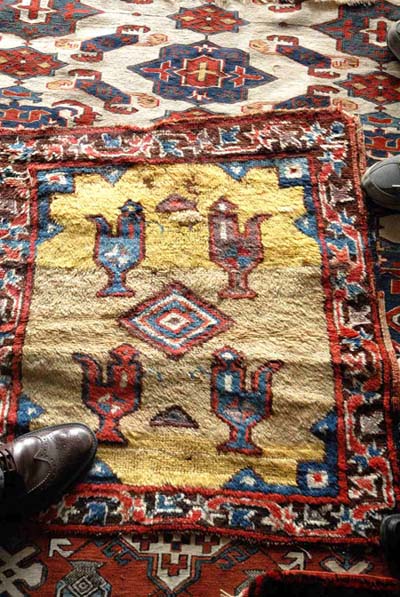
Anyway, the “Caucasian” above
and the mat seem totally “invented”, as the one of salon 85.
I find all
these fakes scary… And perhaps the “creative” ones are scarier than the Karachov
etc., copies.
About the “Rugs are being "faked" by over-restoration as
well”.
Yes, it’s perfectly true, with a distinction: the percentage
of restoration above which an artifact becomes a fake could be a hard subject of
discussion, BUT at least there are still original parts in a restored object –
and hopefully a rug should have the original design conserved.
These
fakes, instead, are 100% “untrue”.
At lest the “creative” ones have some
originality of their own, though, even if it’s MODERN
creativity.
Regards,
Filiberto
Posted by Horst Nitz on 05-22-2007 05:02 PM:
Hi all
years ago in Afghanistan I was visiting an "Antiques factory" -
as one of the consequences I since test woodworm holes on old furniture with a
thin wire. If it goes in straight it is a likely fake.
What is the
equivalent of this test on rugs?
Regards,
Horst
Posted by Sue Zimmerman on 05-22-2007 07:15 PM:
Patrick, I agree with you.
I don't think these reproduction rugs are meant
to be sold as old, either. 10k is not much to spend for "new money" to create a
mood in a room of "old money". It's a harmless decorating thing. If some of them
end up in the hands of rug collectors it's not the factory's fault. They look
like what they are, to me. Not old. Sue
Posted by Sue Zimmerman on 05-23-2007 07:51 AM:
James,
As to mind set of buyer's of "aged" reproduction rugs imagine
this conversation between an owner and an interested visitor...
Visitor:
"I saw a rug just like that in a castle in Architectural Digest a few years
ago!"
Owner: "I know, can you believe it, a rug like that costs 100k?
This one is a reproduction we got for only 10k. We're spending the 90k we saved
by buying it and are taking a cruise around the world next
year!"
Visitor: "Wow! Where can I get a rug like that? I get so tired of
packing and unpacking luggage. A cruise sounds really good."
Posted by Patrick Weiler on 05-23-2007 10:54 PM:
Rug money, rug sense
Sue,
They could have attended the ICOC with the money they
saved!
Patrick Weiler
 Meaning that pieces like
these:
Meaning that pieces like
these:







